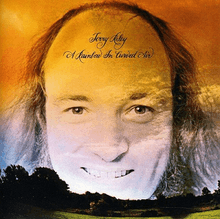A Rainbow in Curved Air
A Rainbow in Curved Air is the third album by American composer Terry Riley. Using overdubbing, Riley plays all the instruments on the title track: electric organ, 2 electric harpsichords (a Baldwin electric harpsichord & a RMI Rock-Si-Chord), dumbec (or goblet drum), and tambourine.
| A Rainbow in Curved Air | ||||
|---|---|---|---|---|
 | ||||
| Studio album by | ||||
| Released | 1969 | |||
| Recorded | 1967–1968 | |||
| Length | 40:17 | |||
| Label | CBS Records | |||
| Producer | David Behrman | |||
| Terry Riley chronology | ||||
| ||||
| Review scores | |
|---|---|
| Source | Rating |
| AllMusic | |
| Pitchfork | 9.1/10[3] |
| Rolling Stone | (favourable)[4] |
| The Village Voice | A–[5] |
The album subsequently influenced a number of rock and electronic productions.[6]
Music
The largely improvisational nature of the work, based on modal scales, owes much to jazz and Hindustani classical music. Some jazz musicians had explored overdubbing techniques before, notably Bill Evans, one of Riley's piano "heroes",[7] on his classic album Conversations with Myself from four years earlier, with its three piano tracks; but Riley uses a far wider range of instruments and colors.
Although continuous in form, A Rainbow in Curved Air can be seen as having three distinct sections or "movements," like a classical sonata or concerto. The first "fast" section gives way to a more contemplative "slow movement" at 6:39. Then, the final more rhythmic section begins at 11:41, dominated by the dumbec, which creates a parallel to how a tabla enters in the final section of a Hindustani raga. The work then ends abruptly. The combination of the one-man-band overdubbing, electronic instruments, and improvisation made for a unique and influential recording, a defining psychedelic work of the 1960s, enhanced by its cover art and the peace poem that constitutes the liner notes.
The companion piece, which constituted the "B" side of the original album, is titled "Poppy Nogood and the Phantom Band." It also employs overdubbing, with Riley again playing all instruments, this time a soprano saxophone (inspired by the playing of John Coltrane)[8] and electric organ. In addition, Riley used a time lag accumulator, consisting of two tape machines, looped audio tape, and a patch cord (this is the "Phantom Band" of the title).[9] A note on the album explains that "The spatially separated mirror images were adapted for studio recording by Glen Kolotkin and resemble the sound Terry gets in his all-night concerts."
The original LP jacket includes a poem on the back cover, written by Riley:
And then all wars ended / Arms of every kind were outlawed and the masses gladly contributed them to giant foundries in which they were melted down and the metal poured back into the earth / The Pentagon was turned on its side and painted purple, yellow & green / All boundaries were dissolved / The slaughter of animals was forbidden / The whole of lower Manhattan became a meadow in which unfortunates from the Bowery were allowed to live out their fantasies in the sunshine and were cured / People swam in the sparkling rivers under blue skies streaked only with incense pouring from the new factories / The energy from dismantled nuclear weapons provided free heat and light / World health was restored / An abundance of organic vegetables, fruits and grains was growing wild along the discarded highways / National flags were sewn together into brightly colored circus tents under which politicians were allowed to perform harmless theatrical games / The concept of work was forgotten
Legacy
The album inspired Mike Oldfield's Tubular Bells and Pete Townshend's organ parts on The Who's "Won't Get Fooled Again" and "Baba O'Riley," the latter named in tribute to Riley and to Meher Baba.[10] It has also inspired progressive, jazz fusion band Soft Machine's instrumental piece "Out bloody rageous". A Rainbow in Curved Air has also had a significant impact on the developments of minimalism, ambient music, jazz fusion, new-age music, progressive rock, and subsequent electronic music. It foreshadows the later overdubbed instrumental works composed by Steve Reich. The 1970s progressive rock band Curved Air named itself after this album.[11] The album's title track is also featured in the video game Grand Theft Auto IV on the in-game radio station "The Journey." Some of the music on this album was used as the background accompaniment of The Guide in the original BBC Radio 4 series of The Hitchhiker's Guide to the Galaxy by Douglas Adams. Was sampled/copied as the sound effects for the 1980 arcade game Moon Cresta.
Other appearances
In 2009 the track "Poppy Nogood and the Phantom Band" featured in the BBC documentary Prog Rock Britannia: An Observation in Three Movements.
On April 26, 2007, Riley gave a live performance of A Rainbow in Curved Air (Revisited). Necessarily, he had to be assisted by other performers: Willi Wynant on percussion and Mikhail Graham working synthesizers and samples.[12]
Track listing
- "A Rainbow in Curved Air" – 18:39
- "Poppy Nogood and the Phantom Band" – 21:38
References
- https://www.discogs.com/Germ-6-Terry-Riley-Pierre-Mari%C3%A9tan-Keyboard-Study-2-Initiative-1--Syst%C3%A8mes/master/146863
- Tyranny, "Blue" Gene. "A Rainbow in Curved Air". Allmusic. Retrieved 26 June 2011.
- Seth Colter Walls (September 4, 2016). "Terry Riley - A Rainbow in Curved Air". Pitchfork Media. Retrieved 4 September 2016.
- Silver, Conrad (7 February 1970). "Records". Rolling Stone. San Francisco: Straight Arrow Publishers, Inc. (51): 44.
- Christgau, Robert (April 23, 1970). "Consumer Guide (9)". The Village Voice. Retrieved January 2, 2018.
- Ankeny, Jason. "Biography". AllMusic. Retrieved 16 October 2017.
- http://www.21st-centurymusic.com/ML210402.pdf
- "Microsoft Word - 80558.doc" (PDF). Retrieved 2016-06-26.
- "Archived copy". Archived from the original on 2011-10-09. Retrieved 2011-07-14.CS1 maint: archived copy as title (link)
- The Who: The Ultimate Collection (Media notes). The Who. MCA Records. 2002. p. 12.CS1 maint: others (link)
- "Curved Air: Biography". Allmusic. Retrieved 2009-04-15.
- "Listen to samples of Terry Riley's music".